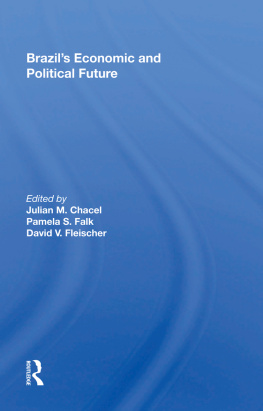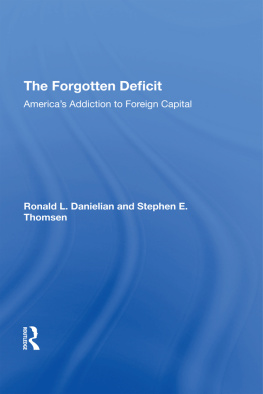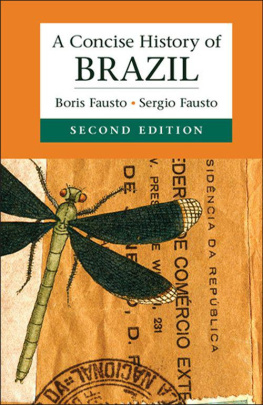Brazil's Economic and Political Future
Letter from the Americas Society's President
The Americas Society is a nonprofit, private institution established in 1981 to coordinate the activities of various U.S. organizations dealing with hemispheric affair s, including those of Mexico, Central and South America, the Caribbean, and Canada. The society, which is national in scope, is located in New York City, with affiliates in New York and Washington, including the Center for Inter-American Relations, the Council of the Americas, the Pan American Society of the United States, and Caribbean/ Central American Action.
Among the objectives of the Americas Society are the provision of a forum for the discussion of issues vital to the hemisphere and the improvement of understanding of the economic, political, and cultural values of all countries of the Americas. The Americas Society seeks to provide a forum through which leaders from government, business, academia, the media, the arts, politics, and other areas can make their thoughts known to diverse national and international audiences.
Along with previous and forthcoming volumes sponsored by the Americas Society and its affiliates, it is hoped that this book will contribute significantly to the research and commentary on this subject.
George W. Landau
About the Book and Editors
The 1985 elections in Brazil returned South America's largest country to democratic rule after two decades of military government. But the Sarney administration faces substantial economic and political challenges: over a 250 percent annual inflation rate, a foreign debt of more than $115 billion, and over a 20 percent unemployment rate. This collection of essays by distinguished Brazilian and U.S. scholars and representatives of both the Sarney and Reagan administrations features the first penetrating analysis of Brazil's economic prospects and its monetary program. Contributors exam ine Brazil's debt crisis, foreign investment, and the balance of trade, giving particular attention to relations between Brazil and the United States. In addition, they review Brazilian politics from a historical perspective, analyze the process of political transition, and explore what redemocratization means for the future.
Julian M. Chacel is director of research for the Brazilian Institute of Economics, Getlio Vargas Foundation, Rio de Janeiro. Pamela S. Falk is associate director of the Institute of Latin American and Iberian Studies at Columbia University, where she teaches U.S. diplomatic history and Latin American political economy. David V. Fleischer is professor of political science and international relations at the University of Brasilia.
Published in cooperation with the Americas Society, Inc.
Brazil's Economic and Political Future
edited by
Julian M. Chacel, Pamela S. Falk,
and David V. Fleischer
First published 1988 by Westview Press
Published 2018 by Routledge
52 Vanderbilt Avenue, New York, NY 10017
2 Park Square, Milton Park, Abingdon, Oxon OX14 4RN
Routledge is an imprint of the Taylor & Francis Group, an informa business
Copyright 1988 by Taylor & Francis
All rights reserved. No part of this book may be reprinted or reproduced or utilised in any form or by any electronic, mechanical, or other means, now known or hereafter invented, including photocopying and recording, or in any information storage or retrieval system, without permission in writing from the publishers.
Notice:
Product or corporate names may be trademarks or registered trademarks, and are used only for identification and explanation without intent to infringe.
Library of Congress Cataloging-in-Publication Data
Main entry under title:
Brazil's economic and political future.
(Westview special studies on Latin America and the
Caribbean)
Bibliography: p.
1. BrazilEconomic policyAddresses, essays,
lectures. 2. BrazilEconomic conditions1985
Addresses, essays, lectures. 3. BrazilPolitics and
government1985- Addresses, essays, lectures.
4. BrazilForeign relationsUnited StatesAddresses,
essays, lectures. 5. United StatesForeign relations
BrazilAddresses, essays, lectures. 6. Brazil
Politics and government1964-1985Addresses,
essays, lectures. I. Chacel, Julian M. (Julian
Magalhes) II. Falk, Pamela S. III. Fleischer,
David V. IV. Series.
HC125.B722 1988 338.981 85-32316
ISBN 13: 978-0-367-00633-4 (hbk)
Contents
- PART ONE
THE BRAZILIAN MIRACLE AND BRAZIL'S FOREIGN DEBT - PART TWO
THE POLITICAL STRUCTURE IN THE NEW BRAZIL - PART THREE
ELECTIONS AND REDEMOCRATIZATION IN BRAZIL DURING THE 1980s - PART FOUR
BRAZIL'S FOREIGN POLICY AND FOREIGN RELATIONS
- PART ONE
THE BRAZILIAN MIRACLE AND BRAZIL'S FOREIGN DEBT - PART TWO
THE POLITICAL STRUCTURE IN THE NEW BRAZIL - PART THREE
ELECTIONS AND REDEMOCRATIZATION IN BRAZIL DURING THE 1980s - PART FOUR
BRAZIL'S FOREIGN POLICY AND FOREIGN RELATIONS
Guide
Foreword:
Brazil's Place in the 1980s
Brazil lives by a historic imperative to be a great state. That vision of Brazil's proper place in the community of nations, guarded and tended by the Itamaraty and the military, has only recently been seen clearly by other Brazilians. Most of them have been deeply and self-consciously engaged in the more urgent task of nation-building. At the turn of the century, Euclides da Cunha, author of Os Sertoes, was shocked to discover the primitive conditions of the Brazilian backlands. Which, he wondered, the coast or the backlands, was the real Brazil? Today, the answer is that bothand allof the diverse cultural, economic, and political parts of Brazil form a single nation.
Contradictions and dynamic tensions abound in Brazil, and as they operate in the nation-building process they may influence and modify the character of Brazil's role in the world. Nevertheless, certain elements of style and substance have become basic to both domestic and foreign policy, and they are unlikely to be affected appreciably by change of political administration. The basic tenet of Brazilian style appears to be a pragmatic determination to keep the options open; the basic tenet of substance is to avoid dependence, both economic and political.
The process of economic developmentone element in nation-building responds to internal competitive forces as well as to the logic of growth. In the past, the Brazilian states of Sao Paulo and Minas Gerais have played roles similar to those of Massachusetts and Virginia early in the history of the United States: They have been engines of growth and they have dominated domestic politics. But as economic growth and development in Brazil proceed, the relative strength of these two states will diminish. Income and power are being distributed more equally among the states because the process of development is, largely and purposefully, a process of internal economic integrationnation-building.
The huge state enterprises serve as instruments of national policy in the drive toward economic integration. Monopolistic or dominant in the power, telecommunications, and nonrenewable natural resource industries, they will be used to provide infrastructure for accelerated growth in selected regions.
They serve also to preserve areas of the economy from foreign ownership. It seems to be well established that economic growth and development will not be permitted to compromise nationalism. Although autarky is not a goal, a high degree of economic independence will be maintained. Nor will jobs be purchased with too big a share of the national patrimony. The informatics regulations, for example, protect a significant portion of the computer industry for Brazilian manufacturers, probably retarding growth in job creation and perhaps even slowing economic development. The military's concern for national security is evident here but so too is a political sense of the need to preserve opportunity and profit for Brazilians.







